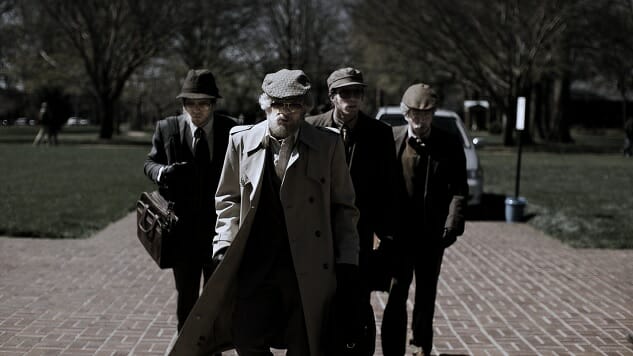American Animals

Bart Layton’s American Animals wraps a fascinating story around an equally fascinating hook, and proffers little reason to justify their marriage. The film chronicles an art heist planned, carried out and spectacularly bungled by a quartet of bored white college boys living in Kentucky around 2004, and Layton covers the narrative with a two-pronged approach: Straight ahead dramatization and talking head documentation, the two occasionally bleeding into each other through the frame. It’s a novel, though scarcely new, aesthetic—theoretically it suits the material handsomely, but in practice, it’s an ill fit.
American Animals is a movie about people who watch too many movies, made by an author who likely also watches too many movies. Layton’s work takes a palpable liking to his subjects not simply for their personalities but for a shared love of cinema. We’re invited to compare his plot to every other film that bears even slight family resemblance to his own, and once you compare a first timer’s output to Martin Scorsese’s, you run into trouble. (Forget Goodfellas: Layton takes cues from Scorsese flicks as recent as The Wolf of Wall Street.) But American Animals’ closest ancestors are found among the films of Richard Linklater and Robert Greene, specifically the former’s Bernie and the latter’s Kate Plays Christine.
Both movies blur lines dividing reality and fantasy by asking the real life people close to the real stories on which they’re centered to litigate them. Like Bernie, and like Kate Plays Christine, American Animals is affixed truth, being the crimes of Warren Lipka (Evan Peters) and Spencer Reinhard (Barry Keoghan), childhood chums who, while attending Transylvania University, get it in their heads to snatch a couple priceless Audubon books from the school’s library. Also like Linklater and Greene, Layton gives camera time to his actors as well as the people they’re playing, extending from Reinhard and Lipka to their accomplices, Eric Borsuk (Jared Abrahamson) and Chas Allen (Blake Jenner), as well as the school’s librarian, Betty Jean Gooch (Ann Dowd).
Unlike Bernie and Kate Plays Christine, American Animals never balances authenticity and artifice. Mostly, we interact with Lipka, Reinhard, Borsuk, Allen and Gooch through interview segments detached from the reenactment scenes that comprise the bulk of its duration. On rare occasion, the original players actually participate in those scenes, as in an early sequence where Layton attempts to establish where Lipka and Reinhard came up with the idea to rob the library in the first place. Their accounts differ. Lipka recalls the conversation taking place at a party. Reinhard remembers it taking place in the car. (Both of them agree that wherever they were, they were cold.)
-

-

-

-

-

-

-

-

-

-

-

-

-

-

-

-

-

-

-

-

-

-

-

-

-

-

-

-

-

-

-

-

-

-

-

-

-

-

-

-








































